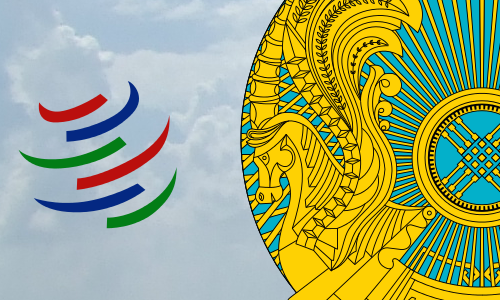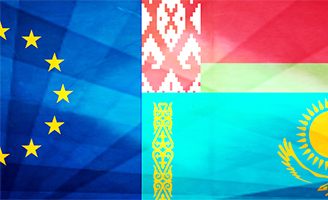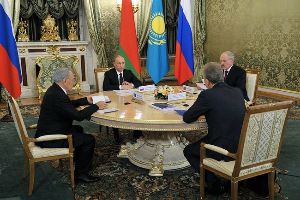Kazakhstan Completes WTO Negotiations
By Nurzhan Zhambekov (06/24/2015 issue of the CACI Analyst)
Kazakhstan completed its accession negotiations with the World Trade Organization (WTO) on June 10 and will join the WTO later in 2015. This is a milestone in Kazakhstan’s economic development. The WTO’s member states voted in favor of Kazakhstan’s accession at a meeting in Geneva on June 22, 2015. Whereas the economic impact is currently difficult to assess, the reduction in trade tariffs should in theory improve the competitiveness of Kazakhstan’s economy, leading to higher economic growth. In practice, Kazakhstan’s experience within the Eurasian Economic Union (EEU) has not been positive, as Kazakh producers have struggled to compete with larger Russian companies. Kazakh consumers are likely to benefit from Kazakhstan’s upcoming membership in the WTO, while Kazakh producers will face increasing international competition.

CACI Analyst, May 27, 2015
Contents
Analytical Articles
THE SOUTHERN ENERGY CORRIDOR: A STRATEGIC PRIORITY FOR THE U.S.?, by Mamuka Tsereteli
ELECTION YEAR IN THE EURASIAN UNION AND THE EU'S EXTERNAL ACTION POLICIES, by Gaël Chataignère
MOSCOW STEPS UP PRESSURE ON CHECHNYA'S POWERFUL RULER, by Valeriy Dzutsev
THE CHALLENGES TO GEORGIA'S ENERGY SECTOR, by Ariela Shapiro
Field Reports
INGUSHETIA'S LEADER CLAIMS THE END OF INSURGENCY IN HIS REPUBLIC, by Huseyn Aliyev
GEORGIA FAILS TO OBTAIN VISA-FREE REGIME AT EaP RIGA SUMMIT, by Eka Janashia
ARMENIA'S AND GEORGIA'S PRIME MINISTERS IRON OUT RECENT STRAINS IN BILATERAL RELATIONS, byErik Davtyan
PARTY RESTRUCTURING IN KYRGYZSTAN PRIOR TO 2015 ELECTIONS, by Arslan Sabyrbekov
Election Year in the Eurasian Union and the EU's External Action Policies
By Gaël Chataignère (05/27/2015 issue of the CACI Analyst)
EU policies toward the two junior members of the Eurasian Union are an indication of the EU’s struggle to balance its normative, geo-economic, and political interests in the former Soviet space. This April, Nursultan Nazarbayev secured a fifth term in office with a full 97.7 percent of the vote, prompting only a mild response from the EU. The European External Action Service simply reiterated the conclusions of the OSCE observation mission, and the importance of the EU’s partnership with Kazakhstan. Meanwhile, despite an ongoing diplomatic thaw, Belarus remains subjected to a comprehensive set of EU sanctions. This seeming paradox questions the consistency and priorities of the EU, just a few months before Belarus holds its own presidential election.

Central Asian Union and the Obstacles to Integration in Central Asia
By Nurzhan Zhambekov (01/07/2015 issue of the CACI Analyst)
After the fall of the Soviet Union, the two largest Central Asian states of Kazakhstan and Uzbekistan took the initiative for Central Asian integration. In January 1994 an agreement was signed in Tashkent for the creation of a Central Asian Union, with Kyrgyzstan joining shortly thereafter. This marked the start of Central Asia’s integration process, aiming to develop and implement projects to deepen economic integration. Today, the idea of Central Asian integration is considered dead, despite numerous attempts primarily by Kazakhstan to revive it. The internal differences between Central Asian states, and their subjection to the influence of external powers, has made the prospect of regional integration increasingly remote.

Bishkek Signs EEU Deal Amid Rising Tensions in the Union
By Arslan Sabyrbekov (01/07/2015 issue of the CACI Analyst)
On December 23, Kyrgyzstan signed an accession agreement to become a member of the Russia-led Eurasian Economic Union (EEU). The new union is an expansion of the Customs Union grouping together Russia, Kazakhstan, Belarus and now also Armenia and Kyrgyzstan.
Upon signing the new accord, Kyrgyzstan’s President Almazbek Atambayev expressed his hope that Bishkek will become a full-fledged member of the EEU by May 2015 and thanked his colleagues for fairly determining accession conditions. The treaty will now fully enter into force after its ratification by the member countries’ parliaments. Russia’s President Vladimir Putin welcomed Bishkek’s decision and noted that the new union will now have a combined economic output of US$ 4.5 trillion, bringing together more than 170 million people.
In the meantime, Bishkek-based civil society activists have issued a statement criticizing the political leadership’s quick decision to enter the EEU. According to them, the government has failed to engage in comprehensive public debate on the subject matter and made the decision behind closed doors. According to MP Omurbek Abdrakhmanov, an outspoken critic of Bishkek’s integration with Moscow, “no one has probably seen the text of the treaty except the country’s key political leadership. The Parliament was supposed to take a decision approving the initiative of the president to enter the Union, but the procedure was not observed. The text of an agreement consequential to the nation’s sovereignty was approved in half an hour.”
Bishkek’s EEU deal comes in the midst of the financial crisis in Russia. Over the last couple of months, the Russian currency has lost between 40 and 55 percent of its value against the Dollar and for the first time in history has even lost ground against the Kyrgyz Som. The ongoing depreciation of the Ruble means that millions of Central Asian migrant workers in Russia can send home less money. The Kyrgyz government is preparing for windfalls from abroad to fall by approximately US$ 1 billion. The decline in remittances, accompanied by massive government spending to keep the currency closer to the dollar, clearly poses a problem to the country’s already troubled budget. In addition, the ongoing financial crisis in Russia along with tougher regulations is already forcing a number of labor migrants to return home and join the pool of unemployed. According to Bishkek based economist Azamat Akeleev, “Kyrgyzstan lacks capacity to accommodate its returning work force and this will definitely lead to various social tensions in the future.”
The decline of the Russian currency is not only a concern for the dependent economies of the Central Asian states but risks undermining the overall stability of the EEU. In light of the ongoing crisis, the President of Belarus Alexander Lukashenko has demanded trade in the Union to be denominated in Dollars or Euros and not in Rubles. He has also sharply criticized Moscow over its trade dispute with Minsk. In response to Western sanctions, Moscow has recently banned imports of foodstuffs from the European Union and in order to prevent Minsk from reselling EU products to Russia, has halted imports of Belarusian milk and meat products through its territory, referring to alleged sanitary reasons. “Contrary to all international norms, we are being denied the right to transit goods from the territory of Belarus and all of this has been imposed unilaterally, without any consultations,” Lukashenko said.
Meanwhile, Kazakhstan’s President Nursultan Nazarbayev has also suggested that Russia’s isolation from the West over the crisis in Ukraine is creating tensions between Moscow and its closest partners. “The instability of world markets and the policy of sanctions will impact the process of building the Eurasian Economic Union,” said the Kazakh leader during his state visit to Ukraine. Contrary to the Kremlin’s position, the Kazakh President also spoke in support of the country’s territorial integrity and offered financial and energy based aid to the struggling government in Kiev.
These stark differences in positions is proof that Moscow’s capacity for influence might be shrinking. The Kremlin was able to draw two small states into the Union, Armenia and Kyrgyzstan, but its ability to transform the union into a broader alliance extending to the political and diplomatic arenas is unlikely to be realized, at least for the time being.
The author writes in his personal capacity. The views expressed are his own and do not represent the views of the organization for which he works.





